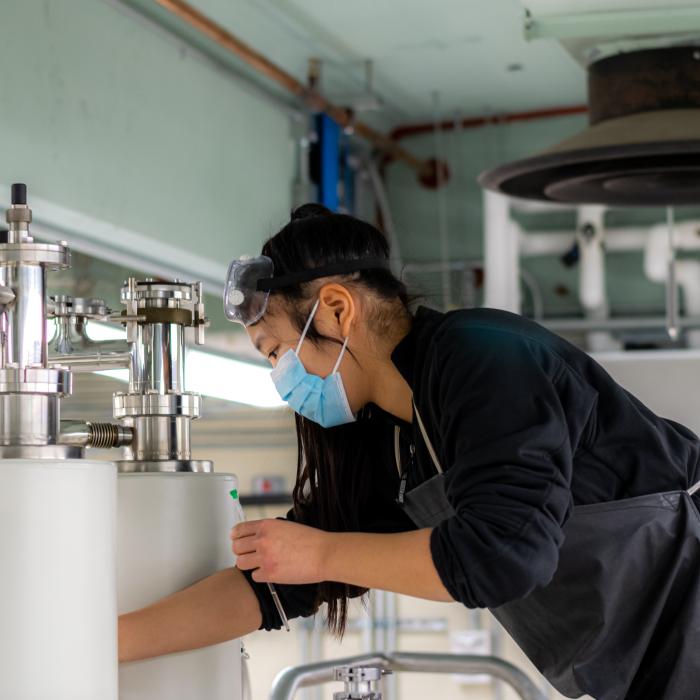News

Inspiring Future Scientists Above and Beyond
by Julissa Velasquez and Viranga Wimalasiri, L.E.A.D.
in collaboration with UVA ChemSciComm
Lana Huang, a high school student from Madison High School in Vienna, VA, reached out to Learning through Experimentation, Awareness, and Demonstration (L.E.A.D) at UVA in hopes of organizing collaborative and instrumental support for her Science Fair project. As a former participant of the UVA Building Leaders for Advancing Science and Technology (B.L.A.S.T.) program, she had previously been exposed to experimental and theoretical chemistry through demonstrations by and interactions with L.E.A.D. The B.L.A.S.T. Program, which is sponsored by the Virginia Space Grant Consortium, specifically seeks to inspire entering high school students from different economic backgrounds towards a STEM career.
Lana’s chosen Science Fair project was a study on “The Effect of Heating on Cooking Oils at the Molecular Level” under the supervision of her high school chemistry teacher, Dr. Padma Iddamalgoda. The focus of her project was to understand how canola, grapeseed, avocado, olive, and coconut oils - which are commonly used in household cooking - are affected by temperature and time. Lana treated these oils at 250, 350, and 450 °F for 3 hours and compared the results to room temperature (68 °F) samples. Her objective was to see whether these treatments changed the molecular structure of these oils by using Nuclear Magnetic Resonance (NMR) Spectroscopy. NMR spectroscopy is a technique which is used to analyze the molecular structure of a material by measuring the interactions of nuclear spins in the presence of a magnetic field. Excitingly, supporting Lana with her project aligned with the objectives of UVA Chemistry’s L.E.A.D, which seeks to promote chemistry through science education and awareness at the local level within the Commonwealth of Virginia.
The Executive Committee of L.E.A.D worked with the departmental NMR facility manager Dr. Jeffery Ellena to organize time and space to collaboratively run the required NMR experiments for Lana. Dr. Elena was exceptionally supportive of this project and provided his expertise on the materials that are required to run these experiments. UVA L.E.A.D was able to cover the materials costs and the instrumentation time required for the studies. Lana and her parents, along with Dr. Padma and her family arrived at UVA Chemistry on 15th January 2022 where they were welcomed by Viranga Wimalasiri (then President) and Julissa Velasquez (then Vice-President) of L.E.A.D along with Dr. Ellena. Samples for NMR were prepared under the supervision of Dr. Ellena and the experiments were run in the Bruker 800 MHz NMR Spectrometer. Dr. Ellena was kind enough to elaborate on NMR Spectroscopy and its importance and function to both Lana and Dr. Padma. Lana received hands-on experience in sample preparation, loading, and using the spectrometer to obtain spectra, as well as spectral analysis. As the data were being collected, Viranga and Julissa provided Lana and Dr. Padma a tour of other facilities available at UVA Chemistry as well as an overview of some of the research done by Research faculty and Graduate students in the Department.
The NMR analysis indicated that the triglyceride component of the oils was slightly altered (<13% of the total composition) due to heat in all oils. Canola oil showed the most degradation, while coconut oil was the most stable under the measured temperature conditions. Lana noted that a potential caveat to the interpretation of this data was that relatively short heating periods were studied and that prolonged exposure to heat might have a greater effect on molecular structure. Lana presented her results in her School Science Fair and the Regional Science Fair and was crowned the winner in the field of Biochemistry on both occasions. UVA L.E.A.D. is hopeful that the significant achievements of Lana will inspire future collaborations where graduate students can provide the necessary tools, guidance, and knowledge for other area students to expand their outreach goals and continue to highlight the work being done in the Department.
